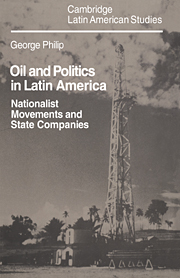Book contents
- Frontmatter
- Contents
- List of tables
- Preface
- Glossary
- Abbreviations
- Note on currencies and other units of measurement
- Maps: Latin America in 1920, 1940, 1960 and 1981; showing importing countries, exporting countries and countries self-sufficient in oil
- Introduction: The politics of oil in twentieth-century Latin America
- Part I The world oil environment
- Part II The major expropriations
- 7 Politics and the concession contract
- 8 Argentina: YPF, Yrigoyen and the 1935 oil law
- 9 Some nationalisations of the 1930s: Chile, Uruguay, Bolivia
- 10 Cárdenas and the Mexican oil nationalisation
- 11 The formation of Petrobrás
- 12 The nationalisation of the ipc in Peru
- 13 The nationalisation of Gulf Oil in Bolivia 1969
- 14 Oil politics in Ecuador 1972–6
- 15 The nationalisation of oil in Venezuela
- 16 Oil companies and governments in twentieth-century Latin America
- Part III The state oil companies
- Notes and bibliography
- Index
- CAMBRIDGE LATIN AMERICAN STUDIES
16 - Oil companies and governments in twentieth-century Latin America
Published online by Cambridge University Press: 23 December 2009
- Frontmatter
- Contents
- List of tables
- Preface
- Glossary
- Abbreviations
- Note on currencies and other units of measurement
- Maps: Latin America in 1920, 1940, 1960 and 1981; showing importing countries, exporting countries and countries self-sufficient in oil
- Introduction: The politics of oil in twentieth-century Latin America
- Part I The world oil environment
- Part II The major expropriations
- 7 Politics and the concession contract
- 8 Argentina: YPF, Yrigoyen and the 1935 oil law
- 9 Some nationalisations of the 1930s: Chile, Uruguay, Bolivia
- 10 Cárdenas and the Mexican oil nationalisation
- 11 The formation of Petrobrás
- 12 The nationalisation of the ipc in Peru
- 13 The nationalisation of Gulf Oil in Bolivia 1969
- 14 Oil politics in Ecuador 1972–6
- 15 The nationalisation of oil in Venezuela
- 16 Oil companies and governments in twentieth-century Latin America
- Part III The state oil companies
- Notes and bibliography
- Index
- CAMBRIDGE LATIN AMERICAN STUDIES
Summary
In the introduction to this section (chapter 7) we considered the assumptions lying behind two influential approaches to government-company relations; the bargaining model and what, for want of a better term, may be described as a ‘class’ model. Now that the main cases of oil expropriation or exclusion of foreign companies have been discussed, it will be useful to return again to the question of how these conflicts are best conceptualised and understood. It should be said at once that all models are abstractions from reality and it would therefore not be difficult to uncover cases in which particular assumptions do not apply. While such an exercise might provide a useful antidote to an excessively dogmatic or arrogant presentation of a particular case, it would not by itself take us very far. It is much better to begin by considering the advantages of each framework before considering how they might usefully be combined, supplemented or modified.
If we take the bargaining model first, it is necessary to proceed by making an assumption of what host government objectives really are. Let us then assume that all Latin American governments wish to take control over their domestic oil industries to the greatest extent possible, and that they will therefore expropriate or exclude foreign capital unless the cost to themselves is high or unless the oil companies or their parent governments have a great deal to offer.
- Type
- Chapter
- Information
- Oil and Politics in Latin AmericaNationalist Movements and State Companies, pp. 312 - 326Publisher: Cambridge University PressPrint publication year: 1982



